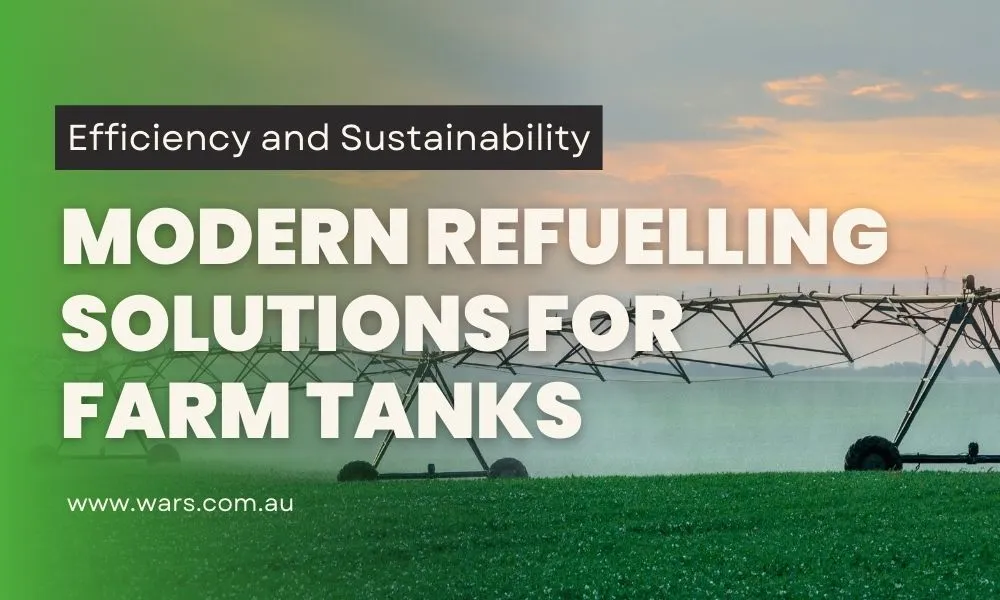
In the vast agriculture landscapes of Western Australia, the role of fuel in farm operations is indispensable. From powering machinery to running irrigation systems, fuel is the lifeblood of agricultural activities. The efficiency of fuel usage directly impacts the productivity and profitability of farms across the region.
As the agricultural sector in Western Australia evolves, so do the demands for efficient and sustainable refuelling solutions. Traditional methods present challenges that hinder progress, making it imperative for farms to explore modern alternatives. This blog explores how adopting contemporary refuelling practices can enhance efficiency, reduce environmental impact, and contribute to long-term sustainability.
We’re going to delve into the drawbacks of traditional refuelling practices on farms, the benefits of embracing modern solutions, considerations for on-farm fuel storage systems, various fuel delivery options, the importance of safety and environmental compliance, and the potential cost savings and return on investment (ROI). By the end, you will have a comprehensive understanding of how modern refuelling solutions can revolutionise farm tank management in Western Australia.
Traditional Refuelling Practices on Farms
Traditional refuelling practices on farms often involve manual handling, leading to inefficiencies and safety concerns. Time-consuming processes and the risk of spills add to the drawbacks, impacting overall farm operations.
Safety and environmental issues associated with conventional refuelling practices are a growing concern. Spillages not only pose risks to workers but also harm the local ecosystem. The need for safer alternatives is critical to ensuring the well-being of both farm personnel and the environment.
The time-intensive nature of traditional refuelling practices translates into increased operational costs. Time wasted on refuelling could be better utilised in more productive farm activities. Therefore, a shift towards more efficient methods is not only safer but also economically prudent.
Benefits of Modern Refuelling Solutions
Modern refuelling solutions offer streamlined processes, significantly reducing the time waiting. Automated systems and advanced technologies ensure a faster and more efficient fuelling process, allowing farms to maximise their operational productivity.
Embracing modern refuelling solutions minimises the risks associated with manual handling, while reducing spillages. Automated systems, with advanced safety features, contribute to a safer work spaces while mitigating the environmental impact.
Modern solutions have a stronger focus on environmental sustainability than past techniques. With stricter regulations in place, adopting eco-friendly refuelling practices helps farms comply with environmental standards, showcasing a commitment to responsible and sustainable agricultural operations.
On-Farm Fuel Storage Systems
Choosing between above-ground and underground tanks involves considering factors such as space availability, cost, and regulatory requirements. Each option has its advantages, and selecting the right storage system is crucial for efficient fuel management.
The material and capacity of farm tanks play a pivotal role in their performance and longevity. Understanding the specific needs of the farm, along with adherence to safety regulations, guides the selection of suitable tank materials and capacities.
On-farm fuel storage systems must incorporate safety features to prevent accidents and spills. Compliance with regulations ensures that farms meet industry standards and guarantees the safe storage and handling of fuel on-site.
Fuel Delivery Options
Bulk fuel delivery services offer a convenient and cost-effective solution for farms with high fuel demands. By eliminating the need for frequent trips to refuel, bulk deliveries enhance efficiency and contribute to a more streamlined operational workflow.
Mobile fuel tanks bring the refuelling station directly to the farm, offering flexibility and convenience. This on-site approach reduces downtime associated with travel, ensuring that machinery and equipment are always ready for use.
Automatic tank monitoring systems provide real-time data on fuel levels, enabling farms to proactively manage their fuel supply. This technology optimises fuel usage, prevents unexpected shortages, and contributes to overall operational efficiency.
Safety and Environmental Compliance
Adhering to safety measures and regulations is paramount in farm tank management. Implementing safety protocols, regular inspections, and employee training contribute to a secure working environment and compliance with industry standards.
Preventing spills through advanced technology and employee training is essential. Additionally, having robust response strategies in place ensures swift and effective action in the event of a spill, minimising potential damage and the environmental impact.
Farm tanks adopting modern refuelling solutions contribute to emissions reduction through efficient fuel usage. This aligns with global sustainability goals and demonstrates a commitment to environmentally responsible farming practices.
Cost Savings and ROI
While the initial investment in modern refuelling solutions may seem significant, analysing the long-term financial impact reveals substantial savings in operational costs, fuel efficiency, and reduced downtime.
The efficiency gains, reduced fuel consumption, and lower maintenance costs associated with modern refuelling solutions contribute to significant long-term savings. The return on investment becomes evident as farms experience increased productivity and reduced operational expenses.
Governments are increasingly offering financial support to sustainable farming practices. Farms adopting modern and environmentally friendly refuelling solutions may be eligible for incentives and grants, further enhancing the financial benefits of such initiatives.
The adoption of modern refuelling solutions for farm tanks in Western Australia goes beyond efficiency and convenience; it’s a commitment to sustainability and responsible farming. By understanding the challenges of traditional practices and embracing innovative solutions, farms can not only enhance their operations but also contribute to a more environmentally conscious and economically viable agricultural sector.
